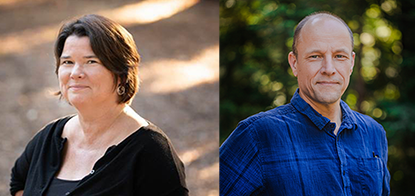Campus News
NSF funding will strengthen infrastructure for open source ecosystems at UCSC
Co-principal investigator Stephanie Lieggi and PI Carlos Maltzahn will develop a plan to recruit research software engineering staff who can establish and maintain the support infrastructure necessary for open source projects to thrive within the university context.

Seven years ago, Adjunct Professor of Computer Science and Engineering Carlos Maltzahn founded the UC Santa Cruz Center for Research in Open Source Software (CROSS) to teach students how to be productive in open source communities, fund students working on research with a plausible path to becoming a successful open source project, and award fellowships to postdocs to grow open source communities around their research products.
Now, the National Science Foundation (NSF) has awarded Maltzahn and CROSS Executive Director Stephanie Lieggi a grant in their inaugural Pathways to Enable Open-Source Ecosystems (POSE) program to fund organizations to create the support infrastructures necessary for open-source research products to become self-sustaining projects with growing user and contributor communities – providing a valuable continuation for projects started at CROSS.
“It’s one of those things where you work for years on something that was a little crazy and many thought, ‘Why would you do this?” Maltzahn said. “And then suddenly you find yourself in this amazing center of opportunity.”
Full-time students often find that their academic milestones can make it impossible to take on the work of managing and maintaining open source projects, and so many promising research prototypes are abandoned. This grant, called a “Phase I” proposal in the POSE program, will allow Maltzahn and Lieggi to develop a plan to recruit research software engineering staff who can, within the university context, establish and maintain the support infrastructure necessary for open source projects to thrive.
The grant funding will specifically support the success of the Skyhook Data Management project, a solution for data storage originally started by CROSS incubator fellow Jeff LeFevre and currently led by computer science and engineering Ph.D. student Jayjeet Chakraborty. Skyhook was recently integrated into Apache Arrow, an industry-leading open source ecosystem for accessing, processing, and communicating large table-based datasets.
“Turning Skyhook into a healthy open source project will increase the impact of all the research that has gone into it,” Maltzahn said. “The Phase I funding lets us figure out how to create a sustainable model for paying staff in the university context, and making that staff position attractive as a career path.”
The new grant will fund a series of workshops to look at methodologies and models for building a sustainable open source support infrastructure around Skyhook. Research software engineers will be tasked with bringing industry-level open source practices into Skyhook to ensure high software quality and a compelling experience for users and contributors. They would also be in charge of the community management aspects of the open source project – mentoring contributors, fielding questions, providing documentation, managing events, and more.
Maltzahn and Lieggi will work with several organizations with years of experience in managing open source ecosystems to develop their plan for sustaining staff, such as the Digital Impact Alliance, a UN foundation organization, as well as the Apache Software Foundation and NUMfocus. This will put the team in a great position to respond to the Phase II funding opportunity of the POSE program that, if awarded, would let them implement this plan and hire research software engineers to manage open source project support infrastructures in the long-term.